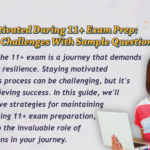The Importance of Breaks in 11+ Studying: Enhancing Reading Comprehension
The journey to success in the 11+ exam is demanding, but it’s essential to remember that effective studying is not just about relentless effort. The strategic use of breaks plays a crucial role, particularly in enhancing reading comprehension skills. In this comprehensive guide, we will explore why breaks are vital in 11+ studying and how they contribute to improved reading comprehension. Understanding the significance of breaks will help you approach your study sessions more efficiently and ultimately boost your performance in this critical examination.
The Challenges of 11+ Studying :
The 11+ exam is known for its challenging nature, with a variety of sections that test a student’s aptitude in verbal reasoning, mathematics, and more. However, reading comprehension is a fundamental skill that underpins success in several sections of the exam. It involves not just understanding the text but also interpreting, analyzing, and drawing meaningful conclusions. To excel in this aspect, students need to be mentally fresh, focused, and capable of sustained concentration.
Why Breaks Are Essential :
Restoration of Mental Energy:
The human brain can only maintain high levels of concentration for a limited time. Taking breaks allows your brain to recharge, preventing mental fatigue that can hinder comprehension.
Enhanced Focus:
Short breaks during study sessions help maintain your focus. They prevent your mind from wandering, which can often occur during long, uninterrupted study periods.
Memory Consolidation:
Breaks aid in the consolidation of information. After studying a particular topic or passage, taking a break allows your brain to process and store the information more effectively.
Reduced Stress:
Extended study sessions can lead to stress and anxiety, which are detrimental to reading comprehension. Regular breaks help reduce stress levels and promote a calmer state of mind.
Active Learning:
During breaks, engage in activities that promote active learning, such as summarizing what you’ve just studied or discussing it with a peer or mentor. This reinforces your understanding of the material.
Effective Break Strategies :
Pomodoro Technique:
The Pomodoro technique involves studying for 25 minutes and then taking a 5-minute break. After four cycles, take a longer break of 15-30 minutes. This technique is particularly effective for maintaining focus and preventing burnout.
Physical Activity:
Incorporate short physical activities into your breaks, such as stretching, walking, or even a quick workout. Physical activity boosts blood circulation and alertness.
Mindful Breathing:
Spend a few minutes practicing mindful breathing during breaks. This can help reduce stress and improve concentration.
Snack and Hydrate:
Fuel your body with a healthy snack and stay hydrated during breaks. Dehydration and hunger can affect cognitive function.
Change of Environment:
Occasionally, change your study environment during breaks. Moving to a different room or simply stepping outside for fresh air can rejuvenate your mind.
Breaks and Reading Comprehension :
Effective reading comprehension relies on your ability to absorb and retain information from a text. Regular breaks enhance your reading comprehension by allowing you to:
Process Information:
Taking breaks between reading passages or articles gives you the opportunity to process and reflect on what you’ve read. This aids in better understanding and retention.
Avoid Information Overload:
Prolonged reading without breaks can lead to information overload. By breaking your reading into manageable segments, you can digest and comprehend the material more effectively.
Focus on Critical Points:
Breaks provide time to identify and internalize the critical points of a text. You can highlight key information and revisit it during your break to reinforce your understanding.
Improve Retention:
Short breaks facilitate the transfer of information from short-term to long-term memory, improving your ability to recall details during the exam.
Conclusion :
In the pursuit of 11+ success, remember that breaks are not a sign of procrastination but a valuable tool for enhancing reading comprehension and overall studying efficiency. By incorporating well-planned breaks into your study routine, you can optimize your cognitive abilities, reduce stress, and retain information more effectively.
The 11+ exam demands not only knowledge but also the skill to comprehend and analyze complex texts. Regular breaks will not only refresh your mind but also contribute to your ability to interpret, infer, and draw meaningful conclusions from the reading materials presented in the exam.
So, as you prepare for the 11+ exam, embrace the power of breaks in your studying routine. They are not interruptions but opportunities to rejuvenate, refocus, and ultimately excel in reading comprehension and all aspects of this critical examination. With a mindful approach to breaks, you can elevate your studying experience and position yourself for success in the 11+ exam and beyond, where reading comprehension continues to be a valuable skill in academia and life.
why not try www.pre11plus.co.uk. – Intuitive & Predictive Learning Platform
join pre11plus whatsapp group for regular updates – pre11plus
Pre11Plus – Nurturing Individual Excellence in Every Learner












